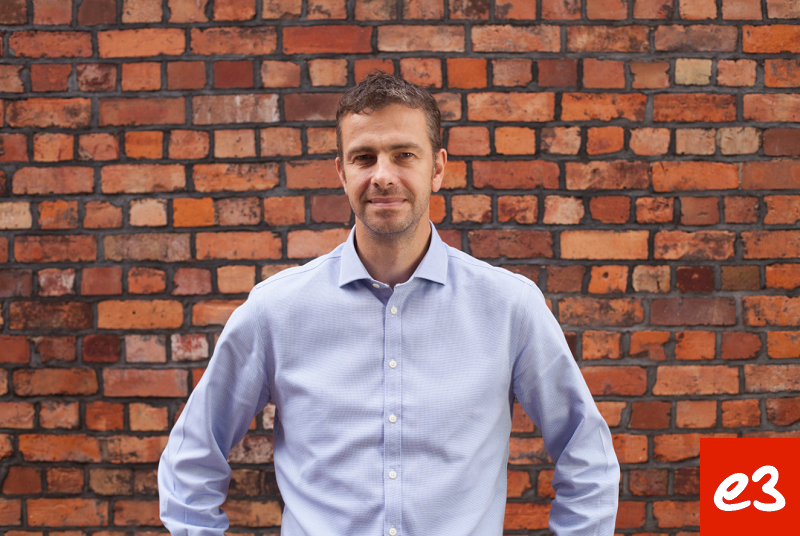“Beware vanity projects…” That’s Neil Collard’s message for businesses considering an app. We sat down with the MD of digital marketing agency E3 to gather his thoughts on the role and future of apps in digital marketing, and to give us his insight into what makes for a successful app development experience.
Problem first
E3 is a strategy-first agency, focussing on problem before platform, as Neil explains; “When smartphones first came out, everyone wanted an app, but these can often be vanity projects that don’t offer value over any other channel. At E3, we first look for the problem the client is trying to solve and start with the analysis of that problem.”
An app is not always the answer. “Once we’ve identified the problem, we can begin to articulate clearly how we are going to solve it. If we’re looking at the most effective way to communicate a certain message, the solution might be a poster in a shop window; it might be a website; it might be a Facebook campaign, or it may well be an app.”
“If an app doesn’t serve a singular valuable purpose, it’s not going to be downloaded, it’s not going to be used and it’s going to be forgotten”
Making the call on which channel or technology to use is not just about understanding the problem, it’s also about understanding that problem from the customer’s perspective; “We need a deep understanding of how the user interacts with the organisation, along with understanding what experience we are trying to give them. Only then can we overlay the best way to solve the problem.”
The need for focus
If an app is the answer to the problem, Neil has some clear ideas about how it should differ from other marketing tools; “A website is quite generalist in terms of what it does for a particular brand, such as overseeing product marketing, giving access to customer support, and a range of other things. Apps need to be far more single-minded, focusing on one particular problem and doing that brilliantly. An app needs to fight for the limited real estate on a customer’s phone – if it doesn’t serve a singular valuable purpose, it’s not going to be downloaded, it’s not going to be used and it’s going to be forgotten, but it’s still going to be costly to maintain.”
- You may like: 44 facts about mobile apps
Examples of this in action? “If you look at an app like OVO, it does some useful stuff like allowing you to upload a meter reading. On the other hand, fitness tracker Strava is brilliant because it’s social and taps into geography well – levering locational data that you can’t normally get on a desktop. Data like this gives an input that allows you to create a more interesting user experience.”
Apps outdoors
Of the apps Neil has worked on, one particular project stands out. “The National Trust’s 50 Things To Do Before You Are 11¾ gets kids out into nature. We’re using the screen to stop kids using a screen, and instead, go and experience nature. It’s a nice subversive approach to marketing to children.”
The 50 Things campaign started as a desktop website rather than a mobile app, but E3 made it clear to the National Trust that an app would significantly boost engagement. As Neil explains, “You want kids to log that they’ve climbed a tree, rolled down a hill, made a mud pie, or whatever else like that, but inherently they’re going to be at a National Trust property, out in the woods, and very possibly away from an internet connection. Having something local and native makes a lot more sense. It also allows the kids to interact in a closed and safer way.” The app has been massively successful, with over 90,000 children taking part, completing over 250,000 activities between them.
Talking the talk
The future? Neil believes that that chat bots and artificial intelligence will have the biggest impact on the apps of tomorrow. And the keyboard’s days are numbered; “I think that the idea of typing stuff will become very antiquated very, very quickly. We’ve already got Amazon Echo and Apple’s Siri, where you just ask a question and it brings stuff back, but to knit together the digital box in the home and the backend on the internet takes a huge amount of bandwidth and intelligence. You need to make sense of human speech and draw on a wide enough pool of knowledge or unstructured data to pull together a meaningful answer.”
“An app needs to fight for the limited real estate on a customer’s phone”
We’ve had voice recognition for a while, but can we use it for anything other than selecting which movie to watch? Neil thinks we can: “As much as voice recognition with intelligent responses has always been the promised land, it hasn’t really been achieved, but now IBM Watson and that kind of multi-layered technology is in the hands of brands.”
E3 have already started to put these technology opportunities to good use: “We’re working with Arthritis Research to help doctors and patients look through massive amounts of unstructured data to come back with a more intelligent response than they can get from their GP or even their arthritis specialist.”
Again, Neil thinks that voice recognition is the key to these interactions. “There’s a tipping point for me where an app becomes more useful than a human in terms of interaction. All you need to do is build a relatively light interaction point, which can be as simple as saying ‘my knee is hurting this morning’ and have it come back with ‘well, the humidity is bad today’, ‘your new drug does this’, or ‘there’s a new piece of research that says this…’, and suddenly you’ve got a set of intelligent, tailored information.”
But does this have to be in an app? “Not really,” says Neil, “It just needs to be a convenient input mechanism. If you have a device in your hand, you’d ask it, but you could ask your Amazon Echo and it would do a similar thing. I think we’ll see a lightening of the experience, to something which is more voice-based. This may or may not be an opportunity for apps, but it’s quite exciting, and it’s where the world needs to get to.”
So there you have it. Apps must be designed with focus and to do what they do well, or else wither on the vine. If an app can give the user a window on a whole new world of data and make it easy to interact with, all the better. A big thank you to Neil for his insight.
For more app intelligence, visit the Calvium blog.








